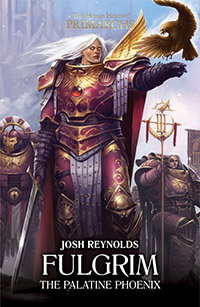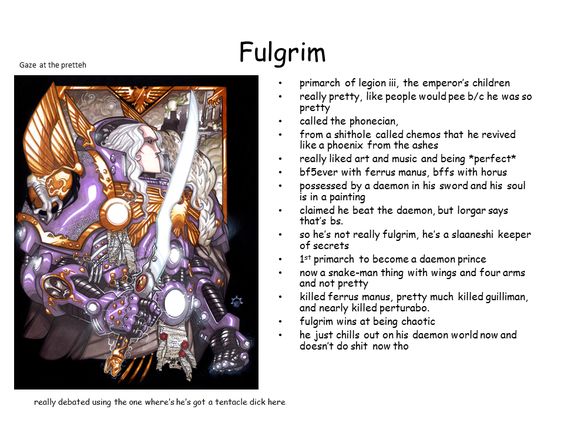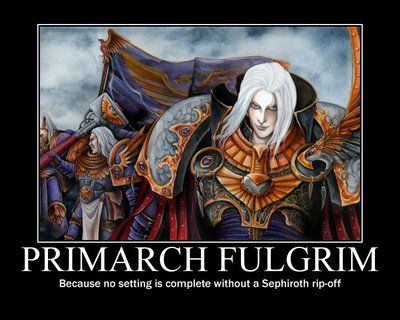 Fulgrim - The Palatine Phoenix
Fulgrim - The Palatine Phoenix
Primarchs
Black Library
October 27, 2017
Limited Edition, Hardcover, eBook, Audiobook

Fulgrim wasn't always an ***hole who listened to a talking sword. He used to be simply an arrogant ***hole, and one who almost died on his first solo expedition in the Great Crusade.
After reading Fulgrim from the Horus Heresy, I jumped into reading the Ferrus Manus primarch novel. For my next primarch novel, why not read another book about Fulgrim? This time it was Fulgrim by Josh Reynolds, which takes place not long after the Emperor finds his wayward son. Most importantly, it takes place before Fulgrim’s fall. Before he becomes a complete asshole.
Before the Dark Times. Before the corpse Emperor.
The sad truth is that Fulgrim is rather lovable before he finds the talking sword. He’s currently in a humbled position. He saved his homeworld from tyrants oppressing the working class, on top of the world, only to be inducted to a Legion with low numbers thanks to a blight in their genetic code. Those who didn’t die from the blight fell in battles before Fulgrim joined them.
The Emperor’s Children are not a joke, per se, but since they have such dwindled numbers, they aren’t participating in any of the Emperor’s Expeditions. They come in to clean up remnants of rebellions and the like.
Thanks to Leman Russ’ goading, Fulgrim forces his Legion into the 28th Expedition. Their first world to bring to compliance will be Byzas, a backwater planet suffering from the same oppressive government Fulgrim’s homeworld did. To prove that his Legion is just as capable as his brothers’, Fulgrim will not bring his whole Legion down to the planet to conquer it. Instead, he brings his Lord Commander and six of the Legion’s best swordsman. He doesn’t want to show the might of his Legion the way his brothers do. He “knows” he has a better way to make a planet compliant. And by golly, he’s going to prove it to all of them.
Fulgrim the Politician
Most likely because Fulgrim rose up in Chemos as a son of a downtrodden factory worker and united the workers against the executive clans, he has a way with smooth talking people. He wins over the planet’s governor to compliance almost immediately. The demigod primarch meets with the planet’s tyrannical patricians, always with a smile on his face and honeyed words. He insists he does not want bloodshed.
Honestly, he doesn’t, and it isn’t because he only brought seven other Legionaries with him. It’s part of how he wants to prove himself to his brothers, part of his better way. He also doesn’t want to flare his temper the way his brothers are often wont to do (he doesn’t name names, but I’m pretty sure he means Russ, Guilliman, Horus, and Dorn). He comes to Byzas with open arms, open ears, and open mind, and yet he’s not going to change his plans. Like a true politician. You want to shake your head in frustration, but he’s just so darn nice about everything that you want to go along with him.

However, he didn’t lie about anything, like most politicians. He promised to make Byzas a better place. He promised to not shed blood if they bowed down to compliance. Fulgrim would have followed through with all of it if the patricians and that Sabazius Brotherhood hadn’t continually sent assassins after him and the continental governor. The Phoenician might have worked with the Sabazians if they were upfront and open instead of working from the shadows.
Pride and Perfection
Fulgrim from the Horus Heresy has made “perfection” a trigger word for me. In Reynolds’ Fulgrim, there was a lesson behind the primarch’s pursuit and obsession with perfection.
Fulgrim achieved compliance, naturally, and it was with only his seven swordsmen. He called his victory perfection, but the Administratum representative who went with him had some corrections for his point of view.
‘Then you must ask yourself this – is the ideal you seek worth the cost?’ She hesitated. ‘This could have all gone very wrong, Fulgrim. You were almost killed at Sabazius-Ut-Anabas, whether you admit it or not. You let your pride blind you, and walked into a trap designed to kill a demigod.’
‘And I walked out again,” Fulgrim said softly. He didn’t look at her.
‘But Cyrius almost didn’t. Corynth and his fellows almost killed him.’
Fulgrim turned. ‘Casualties are the price of victory.’
Pyke frowned. ‘And that is the very excuse those bureaucrats you so detest use to reason away the neglect of your sons. Their lives were spent like bullets, one after the next, to buy victory after victory. I thought you wanted to find a better way, Phoenician.’
Not going to lie, I thought he was going to kill her immediately, no matter how foolish that would have been. He was angry to be sure, but he realized he was angry because she was right. Instead of lashing out, he admitted she was right and he needed to learn from this experience on Byzas.
This was both a powerful moment and a sad one at the same time. It’s sad, as you can expect, because of how Fulgrim fell in the end. Between reading both of these Fulgrim novels, I have a hard time hating the Emperor’s Children primarch. He’s one of the greatest tragic characters of the Heresy, one I think even Shakespeare would be proud of.

By the way, Mr. Reynolds, thanks a pantload for mentioning that Fulgrim’s sword was a most precious gift from his most beloved. Ya gotta twist that talking sword in a little tighter, eh?